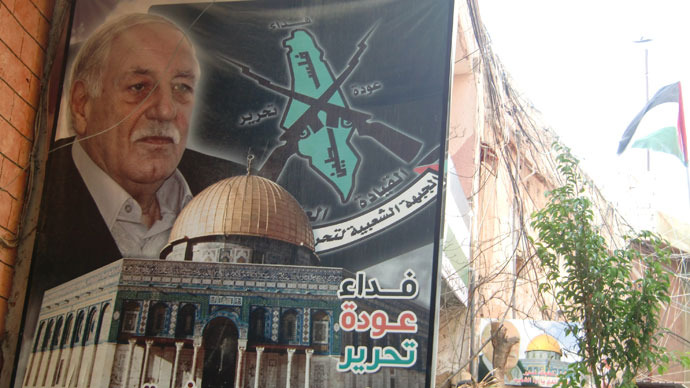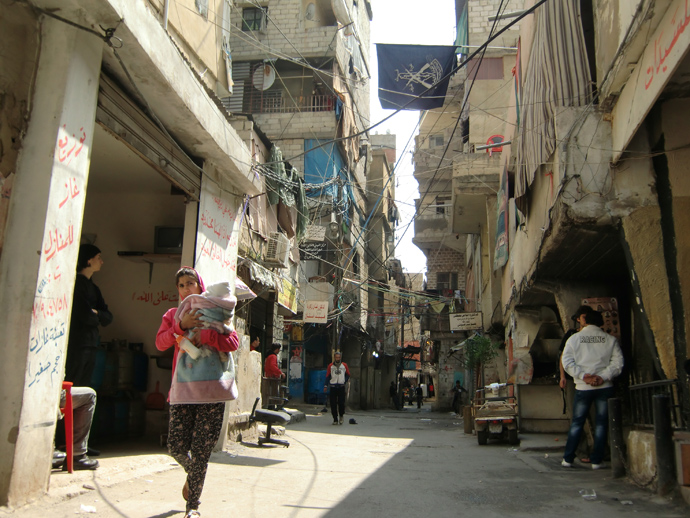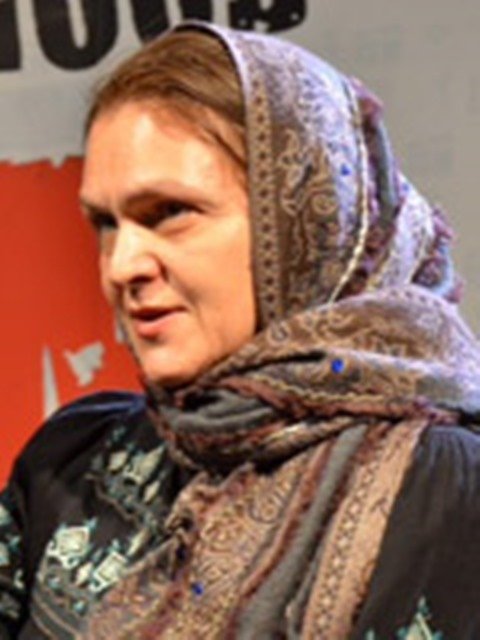Syria is a battle for Palestine

One of the headquarters of the Popular Front for the Liberation of Palestine – General Command is located in a basement in central Damascus.
All secrecy measures are there: one cannot drive through the area; hidden guerillas everywhere, and several dozen CCTV cameras. This is the Palestinian group whose headquarters and weapons were seized in December last year by the Syrian militants in Yarmouk, the largest Palestinian refugee camp in Syria near Damascus.
Several people are sitting in a small room. These are: member of the PFLP GC Political Bureau Anwar Raja, editor in chief of the Palestinian Forward magazine, Tahsin Al Hаlabi, and about five other companions who come and go while we speak.
Anwar Raja was born in Jaffa. He was ten when the Palestinians were thrown out of the Holy Land. He experienced all the tribulations of the Palestinian struggle firsthand. And Tahsin Al Hаlabi was only 10 months old when his family had to leave their home.
‘I was arrested and sentenced to 12 years in an Israeli prison for the right to see my home. During my time in Nablus prison I learned English, French, German, and Italian. And I speak Hebrew better than settlers in Israel’, he laughs.
‘In order to free him from captivity, we seized three Israeli soldiers’, recalls Anwar Raja.

The PFLP is the pioneer of all forms of the Palestinian struggle. The organization was founded in the 1960s, and it’s always relied for its support on refugee camps. They split with Yasser Arafat because they dismissed any negotiations, agreements or concessions with Israel. Starting from the 1960s, the PFPL managed to establish an expansive international front of struggle for Palestine, reaching out to groups like RAF and the Japanese Red Army. They were the ones who, long before HAMAS, would send out kamikazes on no-return missions. They invented what’s now widely known as suicide bombers. They were also the first ones to hijack Israeli passenger airplanes and Israeli servicemen to swap them for prisoners.

In Syria, most Palestinian training camps and bases belong to the Popular Front. They have always been the key arms suppliers to Palestine and Lebanon as they had networks and long-term experience of underground operations. They’re fundamentally against elections and party lists as they believe these are just irrelevant games while they remember that 7 million Palestinians remain refugees.
Until December 2012, the main PFPL GC headquarters was located
in the Yarmouk camp, Damascus, and so was their main arms dump,
which was seized by Syrian rebels. Yarmouk was the first
Palestinian camp from which the Syrian militants threw out 150,000
Palestinian refugees.
The over 700,000 Palestinians living in Syria are the key target of political and military struggle. According to the PFPL, what’s happening today in Syria is meant to draw them into the conflict, to purge Syria of them, and to downplay the Palestinian issue.
‘Assad punished for refusing to turn away from Palestinians’
‘A very difficult time began for us. All these events will have major implications for Palestine’, says Anwar Raja.
He is really hopeful that Syria can withstand it, and that this is the only way for Palestinians to consolidate their positions. In his opinion, the conflict didn’t start two years ago. It had been predetermined by Syria’s fundamental position on the Palestinian issue. All countries of the region turned away from Palestinians and bargained with the US and Israel, whether explicitly or implicitly. Syria was the only one that didn’t give in, he believes.
‘By 2002 the Israeli flags were raised over all the Arabic capital cities except for Syria’, Anwar Raja comments.
‘The key demand of the Palestinians is the return of the Palestinian refugees. Israel will never agree to it as this would bring its end closer. In 2002, the so-called Arab Peace Initiative in Beirut declared the ‘land for peace’ principle. At that time, only Libya and Assad required introducing the return of the refugees clause’, reminds Anwar Raja.

He believes that following the invasion of Iraq, Qaddafi rejected any Palestinian support, but that wasn’t enough to save him. Bashar al-Assad didn’t turn away from the Palestinians, and that was the reason that the West directed the wave of militants against Syria and spread out the Islamic propaganda that Assad was the root of all their troubles.
'And now Israel wants to abolish the Palestinian refugee term through the UN’, says the member of the PFLP Political Bureau.
‘Syria didn’t just allow us to stay here. All of our training camps were in Syria, including the Islamic Jihad. Even HAMAS was exercising here in our camps’, explains Anwar Raja. He reminds that at the PFLP reference, HAMAS was able to settle in Syria. ‘We told Hafez al-Assad that HAMAS were fighters, and he allowed them to come over’.
‘The West and the Arabs insist that the war broke out in Syria because the regime had failed to execute reforms. This is just absurd. Syria held the Palestinian issue on the table. Syria personifies the very idea of the refugees’ right to return. In any other country, the Palestinians are just forbidden to talk about politics’, he believes.
‘Palestinian camps in Syria were attacked. The attackers opened fire, provoked and abducted Palestinians. We told the armed opposition that we would not get involved in the armed struggle in Syria, as we were guests there. The Palestinians formed committees for the sake of the camps security. But George Sabra (the opposition leader) stated on TV that they considered Palestinian camps part of Syria. The militants broke into camps. Yarmouk was ransacked. We asked Khaled Mashaal and Mahmoud Abbas to talk to the opposition, but they never played the intermediary role,' says Tahsin Al Hаlabi.
‘Opposition wants refugees out of Syria’
People I’ve been talking to say that Palestinians are being forced out of Syria. It’s the main goal of the opposition, they say. But they failed to achieve it – Palestinians have remained in Syria despite the terror they’ve been exposed to.
'The fact that the opposition is forcing Palestinians out of Syria means that they are acting on the orders of foreign actors. Only 2,000-3,000 of our refugees fled to Lebanon. People are aware it was not the Syrian army that invaded the Yarmouk camp. They know that 700-800 Palestinians were killed by the militants, and dozens were tortured,' says Anwar Raja.
'If the opposition sought to liberate Palestine, as they sometimes proclaim, Palestinians and Syria in general wouldn’t be in such trouble,' he adds with an air of certainty.
He’s got the evidence to back up his statement. One of the opposition leaders suggested banning Palestinian refugees from working in 72 professions after the victory, like it was done in Lebanon. This way they want to punish Palestinians for not supporting the rebels. But in Lebanon, the ban was introduced for a different reason – Palestinians did take part in the civil war.

The PFPL says the opposition has been juggling with facts when it accused Damascus of failing to take on Israel in the past decades.
'When the Soviet Union collapsed, Syria was left all alone. But it didn’t change its policy. Syria defended Lebanon against Israel in the Bekaa Valley. Syria lost as many as 85 MiG fighters in the battles of 1992. This is what forced Israel to leave Lebanon in 2000, not the efforts of Arab nations. All Syrians fought against Israel in Lebanon and all of them paid a high price for that resistance,' Tahsin Al Hаlabi.
‘Syria invaded by intolerant, new generation Muslims’
Palestinians have been negative about the actions of rebels not only because they stormed their camps.
'60 television channels are now broadcasting anti-Syrian propaganda. People watch it and take it at face value. All the names of the military groups are Islamic. But look at what’s happening! Jihadists beheaded statue of Syrian poet Abul Ala al-Maarri near Aleppo. He was persecuted during his lifetime, but never executed. And now these people came and decided they could be the judges,' he exclaims in surprise.
He believes that Syria has been invaded by a new generation of Muslims, brought up by policymakers from countries with zero tolerance on other religions. These new Muslims have set out to impose new rules that are unprecedented for Syria.
'If Muslims don’t travel to countries when you have a
population mix, then they can believe the most extraordinary things
and do very strange things. The statue of Umm Kulthum, a legendary
female singer who backed the Palestinian cause, was recently
hijabed,' he tells me with a laugh.

He reminds me that there are 10-12 percent Christians among the Palestinians, and that Palestinians have always been friendly towards other confessions. Syria has a broad range of confessions but it never had any sectarian conflicts while now Syrians are being forced to believe that they are run by just one community.
Members of the PFPL are convinced that after two years of the country being destroyed the Syrians are basically living in the same conditions that Palestinian refugees, who were forced to leave their houses and their lands, have been living in for the last 65 years: without water, electricity, or opportunities to make a living.
‘Destruction and devastation everywhere – that’s what the opposition has brought to Syria. What do they propose people fight for? Their recruitment numbers are falling. In Idlib, Zabadani and 5 or 6 other key places the rebels agreed to a ceasefire. The authorities promised amnesty to those who lay down arms. It doesn’t mean that the people who agree support the regime – it just means they are against the war’, thinks Tahsin Al Hаlabi.
These people believe that the US intentions are transparent.
‘It’s an international conspiracy against Syria. Foreign powers have a plan to redraft borders in this region. They use all the means available to make people forget about the Palestinian issue and create a lot of small states, each with a crazy ideology. But Syria is holding on’, says Tahsin Al Hаlabi.
‘It’s not the regime that’s holding on, it’s the
people. It’s not the heroism of one person, group or party. People
and movements light up like stars and then fade away – we,
Palestinians, know that very well. Some are created specifically to
blind everyone with their artificial light. But sooner or later the
illusion will shatter’, elaborates Anwar
Raja.
Nadezhda Kevorkova, Damascus
The statements, views and opinions expressed in this column are solely those of the author and do not necessarily represent those of RT.
The statements, views and opinions expressed in this column are solely those of the author and do not necessarily represent those of RT.













